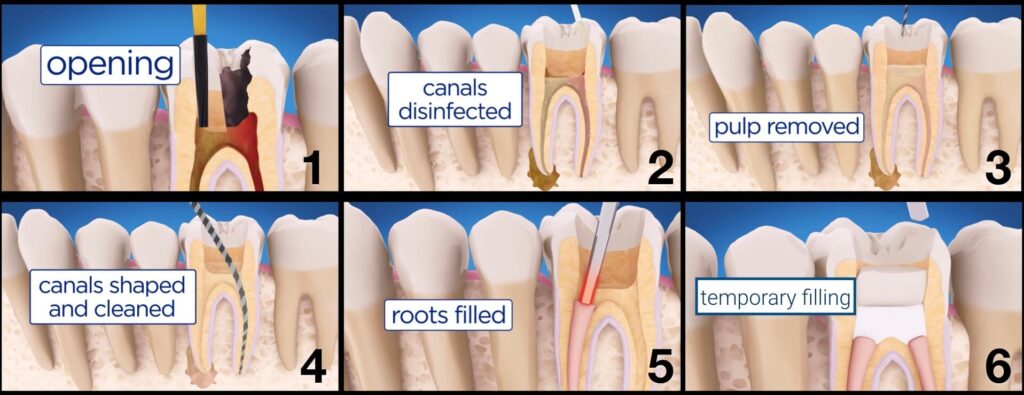What is a root canal?
A root canal is one of the most common dental procedures performed, well over 14 million every year. This simple treatment can save your natural teeth and prevent the need of dental implants or bridges.
At the center of your tooth is pulp. Pulp is a collection of blood vessels that helps to build the surrounding tooth. Infection of the pulp can be caused by trauma to the tooth, deep decay, cracks and chips, or repeated dental procedures. Symptoms of the infection can be identified as visible injury or swelling of the tooth, sensitivity to temperature or pain in the tooth and gums.
If you experience any of these symptoms, your dentist will most likely recommend non-surgical treatment to eliminate the diseased pulp. This injured pulp is removed and the root canal system is thoroughly cleaned and sealed. This therapy usually involves local anesthesia and may be completed in one or more visits depending on the treatment required. Success for this type of treatment occurs in about 90% of cases. If your tooth is not amenable to endodontic treatment or the chance of success is unfavorable, you will be informed at the time of consultation or when a complication becomes evident during or after treatment. We use local anesthesia to eliminate discomfort. In addition, we will provide nitrous oxide analgesia if indicated. You will be able to drive home after your treatment, and you probably will be comfortable returning to your normal routine.
How Does Root Canal Therapy Work?
Watch this video for an overview of root canal therapy.
Frequently Asked Questions About Root Canal Therapy
What is the difference between root canal therapy and root canal surgery?
- Root Canal Therapy – With this treatment, our endodontist at Woodside Endodontics will enter the root canal through the crown of the tooth to remove the infected pulp. Sometimes, this non-surgical option is not effective because the infection is located further down in the root of the tooth. If this is the case, the tooth requires root canal surgery.
- Root Canal Surgery – Surgery allows an endodontic specialist to treat an infection that is further down in the root of the tooth. This is possible because in root canal surgery the specialists enter the root canal through the gum tissue. Both are important and effective endodontic treatments to help save patients’ natural teeth.
When is root canal treatment required?
If you’re experiencing tooth pain when chewing, prolonged sensitivity in the tooth (especially to hot or cold temperatures), discoloration on the tooth, or swelling or sensitive gums, you may have a root canal infection. Root canal infections most often occur when a tooth’s pulp has deep decay, a tooth undergoes multiple dental procedures or large fillings, or if a tooth has a crack, chip, or other trauma. If you have a tooth infection, our specialist at Woodside Endodontics will talk you through the options and course of treatment to get you back to full health and comfort.
How is the root canal therapy done?
A root canal is a complex process that involves a number of steps. This is why endodontist chooses to become experts in this highly-skilled procedure. Prior to beginning the actual root canal procedure, the endodontist will administer the appropriate anesthesia to ensure that you feel entirely comfortable throughout the procedure. Then the specialist goes through the following steps:
- Opening Is Created. The endodontist places a rubber dam on the tooth to keep it clean and dry. Then they create an opening in the crown of the tooth to access the pulp.
- Tooth Is Disinfected. With the assistance of high magnification, the specialist uses a combination of solutions and small instruments to remove the bacteria and debris.
- Pulp Is Removed. The pulp is removed using specially designed instruments
- Canals are Shaped and Cleaned. The Endodontist begins shaping and cleaning the canals.
- Roots Are Filled. Next, the specialist then fills the canals with permanent root canal filling material.
- Temporary Filling. Lastly, the crown of the tooth is filled with a temporary filling.

Steps Involved In Root Canal Therapy
Depending on the severity of your case, a root canal treatment will take one to two appointments, lasting about 60 minutes each.
How painful is root canal treatment?
Root canal treatment has a reputation of being painful. However, patients at Woodside Endodontics often report little to no pain. The procedure may feel similar to a filling or crown placement. If you’re concerned about your root canal treatment, talk with your specialist. We have medication and sedation options to put your mind at ease, and we will work to answer all your questions, ensuring you know exactly what to expect going into your root canal treatment.
How long does it take to heal from root canal treatment?
After root canal treatment you can expect to return to your everyday activities the very next day. The tissue around the treated area will feel sensitive for up to a few days, depending on the severity of the infection. Patients generally only experience mild pain during the days following a root canal.
Is it possible to avoid root canal treatment?
Yes and no.
Once you have a root canal infection, it will not go away on its own. It is important to see a specialist as soon as possible if symptoms occur. Early intervention will help prevent the infection from becoming worse. If left untreated, the infection can reach the tooth’s roots or the jaw bone and further complications can occur.
However, the only way to avoid root canal treatment altogether is by not getting an infection in the first place. The best way to prevent infection is to maintain regular dental hygiene. We recommend doing the following daily:
- Brushing
- Flossing
- Using Mouthwash
- In addition, be sure to visit your dentist for regular cleanings.
Will root canal treatment last forever?
While every patient’s oral health is different, root canal therapy is a highly effective and routine treatment for root canal infections. Sometimes, a non-surgical root canal treatment might not get to the site of infection because it is located further down towards the root of the tooth. In these cases, root canal surgery may be a better treatment option to treat the infection directly through the root.
If you have any other questions please email or call us by visiting our Contact Page to submit a form or call our office at (650) 369-2555


